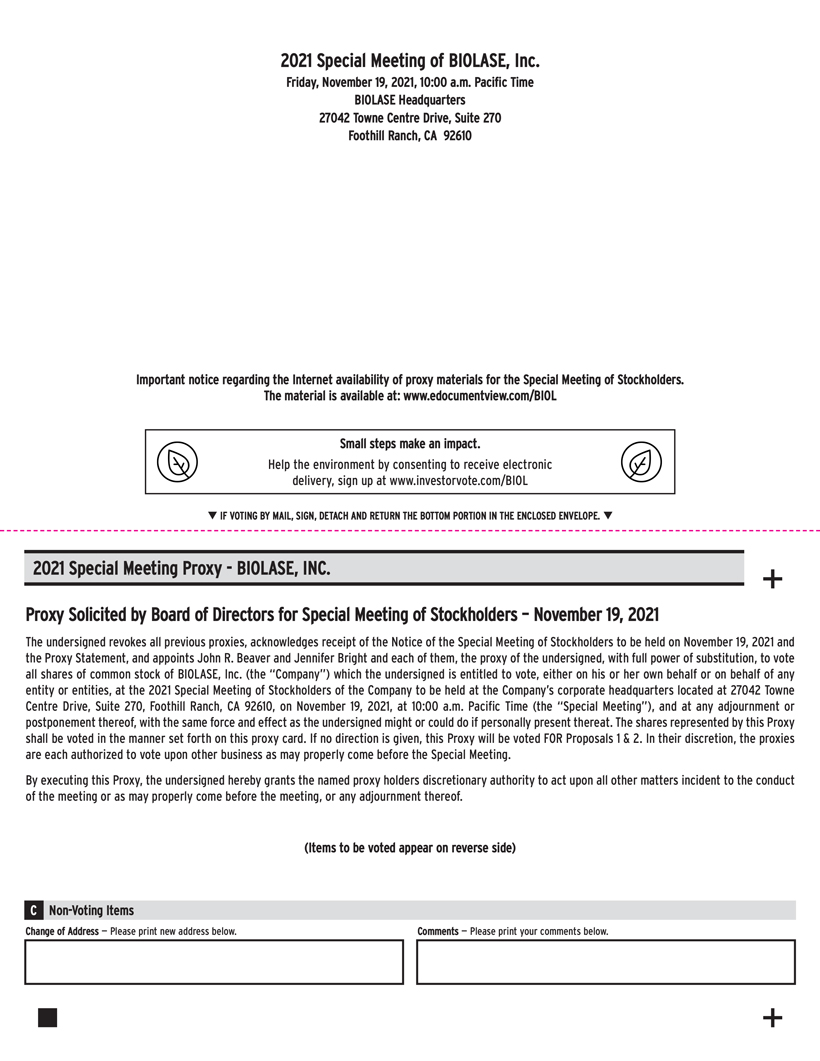On May 24, 2021, we received a deficiency letter from the Nasdaq Stock Market notifying the Company that, for the last 30 consecutive business days, ending on May 21, 2021, the bid price for the Company’s common stock had closed below the minimum bid price. In accordance with Nasdaq rules, the Company has been provided an initial period of 180 calendar days, or until November 22, 2021, to regain compliance. If the Company does not regain compliance by that date, the Company may be eligible for an additional 180 calendar day compliance period. To qualify, the Company would need to provide written notice of its intention to cure the deficiency during the additional compliance period, by effecting a reverse stock split, if necessary, provided that it meets the continued listing requirement for the market value of publicly held shares and all other initial listing standards, with the exception of the minimum bid price requirement. If the Company does not regain compliance with the minimum bid price rule by November 22, 2021, and is not eligible for an additional compliance period, Nasdaq will provide written notification to the Company that its common stock may be delisted.
Our Board is seeking stockholder approval for the authority to effectuate the reverse stock split as a means of increasing the share price of our common stock at or above $1.00 per share in order to avoid further action by Nasdaq, in the event we are not able to satisfy the minimum bid price requirement in adequate time before the deadline. We expect that the reverse stock split would increase the bid price per share of our common stock above the $1.00 per share minimum price, thereby satisfying this listing requirement. However, there can be no assurance that the reverse stock split would have that effect, initially or in the future, or that it would enable us to maintain the listing of our common stock on the Nasdaq Capital Market. We are not aware of any present efforts by anyone to accumulate our common stock, and the proposed reverse stock split is not intended to be an anti-takeover device.
In addition, we believe that the low per-share market price of our common stock impairs its marketability to, and acceptance by, institutional investors and other members of the investing public and creates a negative impression of the Company. Theoretically, decreasing the number of shares of our common stock outstanding should not, by itself, affect the marketability of the shares, the type of investor who would be interested in acquiring them or our reputation in the financial community. In practice, however, many investors, brokerage firms and market makers consider low-priced stocks as unduly speculative in nature and, as a matter of policy, avoid investment and trading in such stocks. Moreover, the analysts at many brokerage firms do not monitor the trading activity or otherwise provide coverage of lower-priced stocks. The presence of these factors may be adversely affecting, and may continue to adversely affect, not only the price of our common stock but also its trading liquidity. In addition, these factors may affect our ability to raise additional capital through the sale of our common stock.
We also believe that a higher stock price could help us attract and retain employees and other service providers. We believe that some potential employees and service providers are less likely to work for a company with a low stock price, regardless of the size of the company’s market capitalization. If the reverse stock split successfully increases the per-share price of our common stock, we believe this increase would enhance our ability to attract and retain employees and service providers. Further, the reverse stock split will result in additional authorized and unissued shares becoming available for general corporate purposes as the Board may determine from time to time, including for use under its equity compensation plans. At our 2021 annual meeting of stockholders, our stockholders approved an amendment to the BIOLASE, Inc. 2018 Long-Term Incentive Plan to increase the number of shares of our common stock available for issuance under the plan by an additional 24,700,000 shares (the “Plan Amendment”). Notwithstanding stockholder approval of the Plan Amendment, we cannot grant any additional awards under the plan because we do not have a sufficient number of authorized shares under our Certificate of Incorporation. The reverse stock split would help ensure that we have adequate shares available to make awards anticipated by the plan (functionally giving full effect to the previously approved Plan Amendment) and allow the Board flexibility for future issuances, including the ability to potentially replace certain cash incentive awards with equity awards.
We believe that the decrease in the number of shares of our outstanding common stock because of the reverse stock split, and the anticipated increase in the price per share, would possibly promote greater liquidity for our stockholders with respect to their shares. However, liquidity may be adversely affected by the reduced number of shares that would be outstanding if the reverse stock split is effected, particularly if the price per share of our common stock begins a declining trend after the reverse stock split is effectuated.
8


